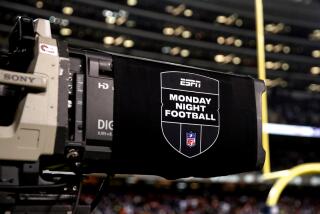Tired of cable TV disputes, bills? More are cutting the cord
A lot of people are sick of the money-grubbing spat between Time Warner Cable and CBS, which has resulted in CBS, Showtime and other channels being unavailable to the cable company’s subscribers since Aug. 2.
For Alan Ehrlich, this was the last straw. He decided to cut the cable cord.
More and more people are doing the same. The U.S. pay-TV industry lost about 316,000 subscribers in the 12-month period that ended June 30, according to Moffett Research.
“Cord cutting used to be an urban myth,” said analyst Craig Moffett. “It isn’t anymore.”
ASK LAZ: Smart answers to consumer questions
But many people still may view cutting off cable or satellite as a radical step, just as setting up a high-definition antenna to watch free, over-the-air signals may seem like the kind of thing only a bona fide techno-geek can pull off.
Ehrlich, 49, of South Pasadena, told me he’s not the most technologically savvy person you’ll ever meet. He placed his level of technical competence at being able to get the VCR to stop flashing “12:00” over and over.
“I’ve heard stories of people cord-cutting,” Ehrlich said. “I always wondered how hard it was, or if I would miss cable.”
When CBS-owned channels were pulled from Time Warner Cable because the two companies couldn’t agree on how much money should change hands, he decided he’d had enough. He contacted Time Warner and canceled his TV subscription.
Ehrlich had been paying roughly $95 a month for TV and Internet access. He kept the Internet portion of his service, which runs about $58 monthly, but he can certainly do better.
Time Warner offers lower Internet-only rates, such as its “Essentials” service that current customers can get for $27 a month. AT&T offers high-speed Net access for as little as $15 a month. Verizon offers Net access starting at $20 monthly.
But these are bargain-basement plans. To handle video streams, you’d want something with more digital oomph, which would cost more. Time Warner’s recommended plan for streaming videos will run you $55 a month.
After canceling his TV service, Ehrlich went straight to Best Buy and bought an RCA high-definition antenna for around $30.
“Hooking it up to the TV was easy,” he said. “Any 5-year-old could do it.”
The HD antenna allows Ehrlich to receive all the usual local channels, plus a bunch of additional channels broadcast digitally by local stations that he couldn’t receive with cable. These give him mostly older shows and movies.
There are also a number of foreign-language channels, including Spanish, Korean and Japanese offerings. The Home Shopping Network is available. So is QVC, Ion Television and some religious channels.
Many cord-cutters use a Blu-ray player or a game console such as the Xbox or PlayStation to access Netflix, Hulu and other online entertainment services. Ehrlich has a “smart TV” capable of receiving a signal from his Wi-Fi Internet router.
He signed up for Amazon Prime to watch movies and recent TV shows. That costs him about $7 a month. He watches “The Daily Show” for free on Comedy Central’s site. He can watch “Breaking Bad” on AMC’s site.
Ehrlich may have to wait a little longer than cable subscribers to catch episodes of some of his favorite shows, but he doesn’t particularly care. In the long run, it’s all the same.
“The programs I’m interested in, I’m watching,” Ehrlich said.
His only complaint was that Time Warner Cable kept billing him for TV service even after he canceled his subscription. A company spokesman, Dennis Johnson, told me a mistake had been made. He said Ehrlich would be credited $30 for the overcharge.
I asked Ehrlich whether he had any regrets about joining the ranks of cord-cutters. Does he miss all those cable channels?
“Absolutely not,” he answered without hesitation. “The best way to send a message to companies like Time Warner and CBS is to take the plunge.”
He’s got a point.
CVS privacy
I wrote last week about CVS Caremark requiring people to forgo federal privacy protections if they want rewards for prescription-drug purchases. This caused quite a stir among customers, not to mention among CVS executives.
The company sent talking points to its store managers and pharmacists nationwide “to address any customer concerns” they may encounter as a result of the column.
“Contrary to recent coverage in the Los Angeles Times, we do not ‘redisclose’ patients’ personal information,” the memo emphasized.
I didn’t pull the possibility out of the air. As I reported, CVS’ enrollment process for its ExtraCare Pharmacy & Health Rewards program includes a warning that “my health information may potentially be re-disclosed and thus is no longer protected by the federal Privacy Rule.”
I had asked a CVS spokesman, Mike DeAngelis, to elaborate on this, and he declined to comment. I raised the question once again this week in light of the company’s talking points.
“The ‘redisclose’ statement is required as part of the HIPAA privacy rule,” he replied. “As we stated to you, we do not share patients’ personal info.”
HIPAA, the federal Health Insurance Portability and Accountability Act, “gives you rights over your health information and sets rules and limits on who can look at and receive your health information,” according to the U.S. Department of Health & Human Services.
The importance of the law is highlighted by the fact that it requires a drugstore or hospital to warn people that, if they waive their HIPAA rights, their confidential medical information might be shared with others.
Without the law’s protections, you have only a business’ word that it isn’t hawking your info to the highest bidder. If that’s good enough for you, then you have nothing to worry about.
David Lazarus’ column runs Tuesdays and Fridays. He also can be seen daily on KTLA-TV Channel 5 and followed on Twitter @Davidlaz. Send your tips or feedback to david.lazarus@latimes.com.







